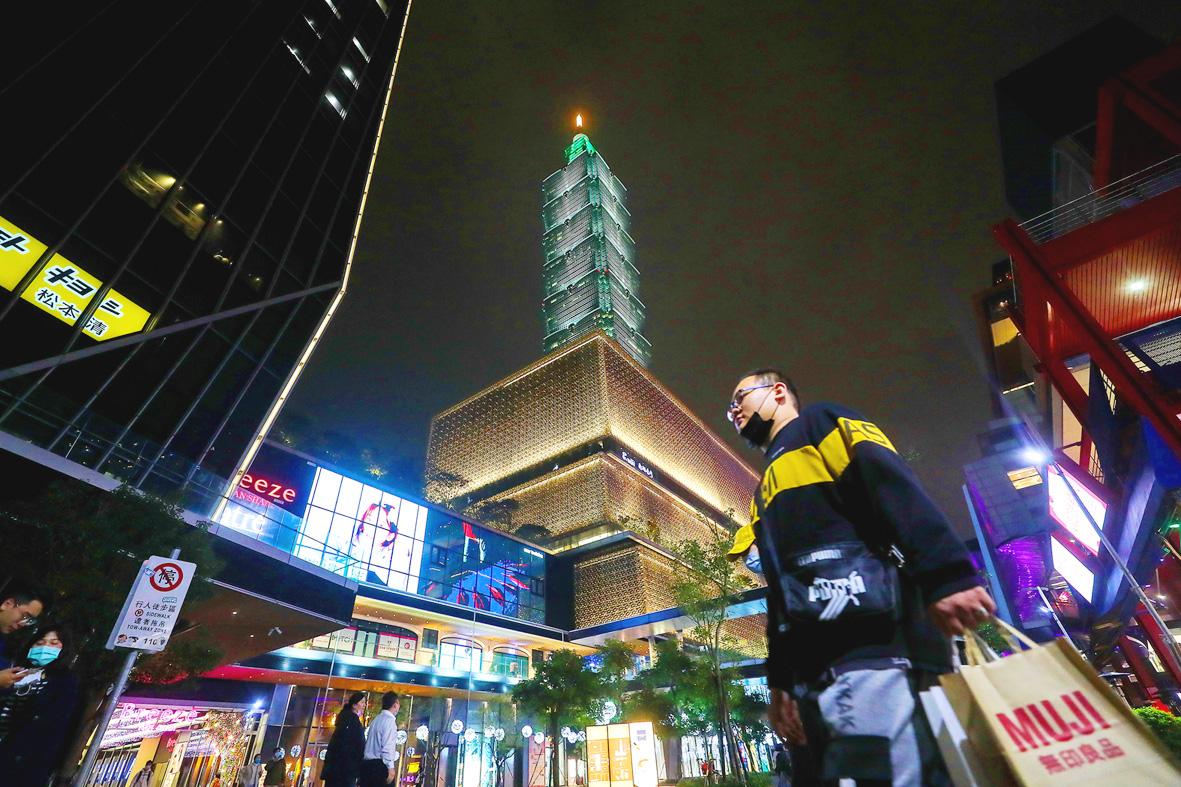Taiwan’s economy ranked sixth in this year’s Index of Economic Freedom, as its overall score picked up 1.5 points due primarily to an improvement in government integrity, an annual Heritage Foundation survey released yesterday showed.
The nation ranked 11th in last year’s edition of the survey.
The US think tank measures 12 freedoms, from property rights to financial freedom, grouped into four categories: rule of law; government integrity; judicial effectiveness; and regulatory efficiency and open market.

Photo: CNA
Taiwan was fourth among 40 economies in the Asia–Pacific region after Singapore, New Zealand and Australia, with an overall score of 78.6, above the regional and world averages, the survey showed.
Taiwan’s economy put up its best performance in the survey’s 27-year history, inching closer to the ranks of the free than ever before, it said.
The main factor holding Taiwan from the top economic freedom category remains a relative lack of labor freedom, it said, adding that the government raised the minimum wage again last year, despite the possibility of damage to productivity and flexibility for workers.
As of December last year, Taiwan reported only seven deaths related to the COVID-19 pandemic, which the survey called a remarkably low figure, compared with fatalities in other economies.
Taiwan’s trade-dependent economy is driven by a competitive manufacturing sector that encompasses electronics, machinery, petrochemicals, and information and communication technology products, it said.
Taiwan’s business freedom is among the highest at 93.4, and has ranked above 90 year since 2013, it said.
However, the nation’s workforce is shrinking with an aging population and there is also a shortage of blue-collar manufacturing workers, it said.
The government provides research and development grants to encourage local high-tech firms to forge partnerships with foreign companies, it said.
Taiwan has six preferential trade agreements and 380 non-tariff measures with average tariff rates standing at 2 percent, the report said, adding that some agricultural imports face additional barriers.
The nation also has a well-developed investment framework that facilitates the flow of goods and capital, it said.
The financial sector continues to evolve and expand, and the stock market is open to foreign participation.
Interests in property are protected, and the system for recording mortgages and liens is reliable, it said.
While corruption is much less prevalent today, it remains a problem, especially because politics and big business are closely intertwined, the foundation said.
The top individual income tax rate is 40 percent and the top corporate tax rate is 20 percent, while the overall tax burden equals 8.9 percent of total domestic income and public debt is equivalent to 28.2 percent of GDP, it said.

SECURITY: As China is ‘reshaping’ Hong Kong’s population, Taiwan must raise the eligibility threshold for applications from Hong Kongers, Chiu Chui-cheng said When Hong Kong and Macau citizens apply for residency in Taiwan, it would be under a new category that includes a “national security observation period,” Mainland Affairs Council (MAC) Minister Chiu Chui-cheng (邱垂正) said yesterday. President William Lai (賴清德) on March 13 announced 17 strategies to counter China’s aggression toward Taiwan, including incorporating national security considerations into the review process for residency applications from Hong Kong and Macau citizens. The situation in Hong Kong is constantly changing, Chiu said to media yesterday on the sidelines of the Taipei Technology Run hosted by the Taipei Neihu Technology Park Development Association. With

CARROT AND STICK: While unrelenting in its military threats, China attracted nearly 40,000 Taiwanese to over 400 business events last year Nearly 40,000 Taiwanese last year joined industry events in China, such as conferences and trade fairs, supported by the Chinese government, a study showed yesterday, as Beijing ramps up a charm offensive toward Taipei alongside military pressure. China has long taken a carrot-and-stick approach to Taiwan, threatening it with the prospect of military action while reaching out to those it believes are amenable to Beijing’s point of view. Taiwanese security officials are wary of what they see as Beijing’s influence campaigns to sway public opinion after Taipei and Beijing gradually resumed travel links halted by the COVID-19 pandemic, but the scale of

A US Marine Corps regiment equipped with Naval Strike Missiles (NSM) is set to participate in the upcoming Balikatan 25 exercise in the Luzon Strait, marking the system’s first-ever deployment in the Philippines. US and Philippine officials have separately confirmed that the Navy Marine Expeditionary Ship Interdiction System (NMESIS) — the mobile launch platform for the Naval Strike Missile — would take part in the joint exercise. The missiles are being deployed to “a strategic first island chain chokepoint” in the waters between Taiwan proper and the Philippines, US-based Naval News reported. “The Luzon Strait and Bashi Channel represent a critical access

Pope Francis is be laid to rest on Saturday after lying in state for three days in St Peter’s Basilica, where the faithful are expected to flock to pay their respects to history’s first Latin American pontiff. The cardinals met yesterday in the Vatican’s synod hall to chart the next steps before a conclave begins to choose Francis’ successor, as condolences poured in from around the world. According to current norms, the conclave must begin between May 5 and 10. The cardinals set the funeral for Saturday at 10am in St Peter’s Square, to be celebrated by the dean of the College